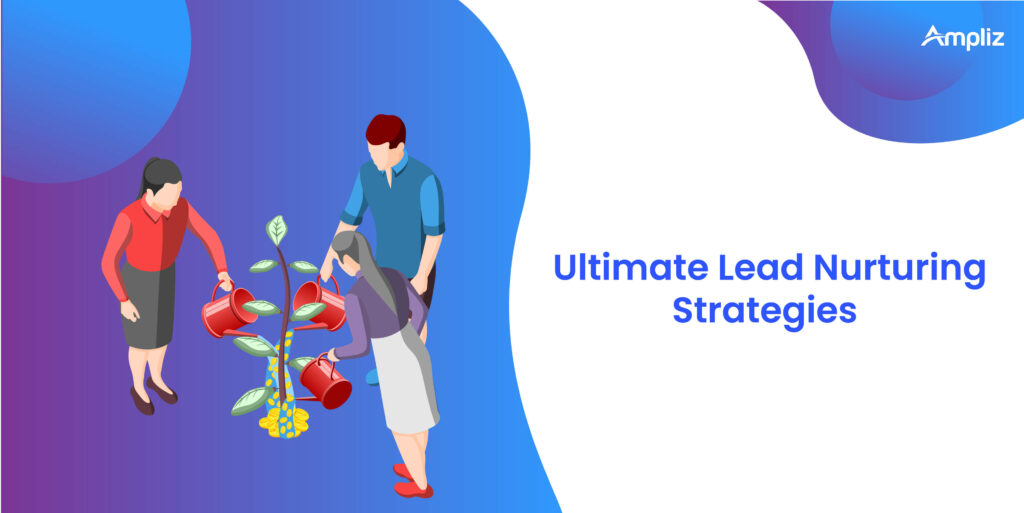Lead nurturing is one of the toughest things to do in the buying process. Following the right b2b lead nurturing strategies will help you to identify the right leads.
Imagine you have a lead pipeline full of SQLs. Even your past customers also prefer you over others. Whenever they think about the product you are selling, the first person that comes to their mind is you. They are satisfied with your product, and even they spread the good word about you and your product.
How fascinating this looks, right? But it can become reality, you know how?
Through the lead nurturing best practices.
The relationship between you and your prospects/customers is like you and your plant. The more you nurture it, the more they will give results in terms of trust in you.
When you bring the plant to your home, you don’t accept the fruit on the very second day, right?
You give them enough water, sunlight, and nutrition and then only you accept them to give you the outcome.
Similarly, you need to also engage, support and build meaningful relationships with your leads, prospects, and customers to make them trust you.
And this is what is called the lead nurturing process.
Now in this digital age, everyone is trying very hard to gain people’s attention, and putting efforts to engage them, educate them, and build relationships with them.
So what different you should do in terms of lead nurturing that helps you to build meaningful relationships with your prospects?
You don’t have to do anything big, just do small things very effectively.
If you do not know what to do and how to do it, then no worries.
This blog is written just for that. Here we are going to show some effective lead-nurturing strategies that help you to ace your marketing approach.
Let’s get started.
So, how do you do lead nurturing best practices effectively? So that you start cracking deals, the prospects start flowing down the pipeline, and salesperson keeps closing deals one after the other.
How to do Lead Nurturing Strategies?
Lead nurturing helps you to be active and show presence on the channels where your buyers are active, engage them, and increase the chance that they will start a relationship with your business.
Building a relationship is to have the right message at the right place at the right time. Here it is what you need to have to do lead nurturing tactics better.
- Have a complete understanding of the buyer persona across the organization.
- Define your Goal (Attention and Interest vs. Conversion)
- Align sales and marketing objectives.
- Identify all the opportunities touchpoints across the channels (Email, Social, Content, Event).
- Create messages across channels for each action taken by the lead.
- Define actions in different stages of the funnel (First Contact –to – Follow Up).
- Add weightage to different actions taken by the lead.
- Use a Lead Scoring System
- Have a CRM in place, keep track, and analyze each lead.
When you have most of the above things in place, it becomes more comfortable as you only need to have the right strategies in place. The right approach will help you build a mutually beneficial relationship.
It’s a warm-up for purchase. There are two different central notions when it comes to lead nurturing strategies:
- Drip Campaign: A series of content is sent at regular intervals keeping the brand name top of mind. It could, for example, be a welcome series flow; (monthly, quarterly, and weekly) newsletters or a product/company updates flow.
- Lead Nurture Campaign: You may perhaps say that it’s the drip-campaign version 2.0. While drip campaigns are explicitly based on timing, lead nurture campaigns are behavior-based, and other attributes lead exhibit. For example, a click on a particular product or a CTA phrase triggers an email relevant to that specific product.
So it is the same idea that triggers differently.
11 Best Lead Nurturing Strategies 2025
When it comes to nurturing your lead, the very first thing that you should do is have a basic understanding of your leads and prospects. Like their age, gender, interest, on which platform they spend most of their time, their challenges, their goals, and needs.
Once you know, and understand this, you can nurture them more effectively.
Now let’s see different b2b lead nurturing best practices.
1. Use Multichannel Marketing Strategies
The best lead nurturing strategy is to rely on every platform. Today people are everywhere, be its social media or email. You should never rely upon only one platform. Utilize and master all the platforms where your prospects spend most of their time.
As a multichannel marketing, you can try social media, marketing automation, paid retargeting, and sales team outreach to connect with customers on multiple platforms.
2. Send Personalized Emails
When it comes to b2b lead nurturing strategies, personalized emails do wonders. Because email is the place where you have your own audience, who have subscribed to your email list because of their interest in your product.
On emails you can segment your subscribers according to their age, gender, interest, geographic location, and buying potential.
With this segmentation, you can send personalized emails with which each of your subscribers resonates and feel connected.
Personalization is one of the great ways to engage your prospects and build a meaningful relationship with them.
3. Have one-on-one Conversations with Prospects
No B2B lead nurturing strategy beats the magic of one on one conversation. Try to find opportunities to have one on one conversations with your prospects. Whether it’s on social media, email, or in person.
One-on-one conversation helps you to know your prospect better, and clear their doubts, help to overcome some of their challenges, and so on.
It’s one on one conversation that lets you demonstrate your product to your prospect and educate them about its benefits. You can also ask their opinion about your product, and their likes, and dislikes of your product.
4. Take Regular follow-ups
You know it takes almost 6-7 follow-ups to close any deal. Whether it’s inbound or outbound lead generation, follow-ups at regular intervals do matter a lot. It’s also an important kind of lead nurturing strategy.
Taking follow-ups doesn’t mean just asking about when they are going to buy your product.
Taking follow-ups means you need to thoroughly s8tudy their product or service and find the loopholes which your products can fill. And then talk about it and ask them if they would try your product/ service.
So this is a great way of lead nurturing and marketing your product.
5. Content Marketing
Content is king. And it is the best way to showcase your expertise. When you write informative and educating content and publish it over different platforms people do find reasons to trust you and your product.
You can generate the content for each stage of the buyer’s journey namely, awareness, consideration, and finally decision-making.
This way you can educate the audience in each stage and build meaningful relationships with them.
6. Implement the Lead-scoring Technique
At a certain stage of lead nurturing, you have to segregate the leads which are ready to pass to the sales team.
On the basis of the behavior of your leads on your website, you take the decision whether to nurture them more or pass them to the sales team.
And this decision is known as the lead-scoring technique. The lead scoring technique is a technique to rank the lead against a scale that represents the certain perceived value each lead represents.
Lead scoring is generally done by assigning numeric values for certain website behavior, event conversion, and even social media interaction.
This score is then used to decide which lead is ready to pass to the sales team and which leads need to be nurtured more.
7. Align Your Sales and Marketing Strategies
It’s so important for both sales and marketing teams to get on the same page. For effective and easy conversion sales and marketing teams have to walk hand in hand.
They both should align and put effort to know which leads are at which point in the sales funnel. And for this, lead scoring comes in handy.
The sales team should be able to identify which visitors are of greater priority once the marketing team attracts them.
8. Lead Management Process should be in Place
You are only halfway through once you have generated the leads. When you have generated the leads but haven’t managed them properly, your lead pipelines will become cluttered with unqualified leads and dead ends.
And you would not want this to happen, right? To avoid this, and to organize your leads properly you need to have a proper system in place.
A system that defines how leads will be registered, and qualified, when follow-ups should happen, and what information about leads is required.
This system helps in the effective nurturing of the leads.
9. Collect Important Lead Data
The purpose of lead nurturing best practices is to be at the top of your readers’ minds. And this happens when you understand them thoroughly and send them relevant messages.
And to understand them you need to create a lead generation form to collect important information about them. You can gather this data through customer reviews, online activity, research about the leads completely, and more.
10. Set an Appropriate Pace
Though it’s important to nurture the leads and to be on the top of their minds, you have to decide a pace and interval of targeting them with your ads and emails.
If your ads appear every time they open their social media or emails, they will get bored and ignore you.
At the same time, if your frequency of targeting them with ads and emails is too less, they will not take you seriously. And that’s why it’s very important to have an appropriate pace to send advertising to keep your audience engaged.
11. Create a survey
Create a survey to know your target audience’s preferences, and to know where they are in their customer journey. These insights will help you to create content for targeting your prospects.
Sometimes, some of your prospects are using other brands’ products similar to yours, at that time you can create the product demo and comparison between you and other brands. This way also you can nurture your leads.
Jonathan Aufray of Growth Hackers says, “The most effective way to nurture leads is through emails,” “Why? The reason is that email marketing tools are very cost-effective when matched with advertising. Also, you can completely mechanize your email marketing campaigns.”
Benefits of B2B Lead Nurturing Strategies
One of the main benefits of B2B lead nurturing strategy is to improve the conversion rate and sales. As per the report, the companies that nurture the leads regularly have 50% more sales-ready leads at 33% lower cost.
Let’s see what are the other benefits of b2b lead nurture strategy. Lead nurturing statistics helps you in
1. Building relationships with prospects
Regularly nurturing your leads with quality content helps you to build meaningful relationships with them. By doing so, they will always remember you when searching for some answers. And this is the purpose of lead nurturing.
2. Becoming a trusted leader in the industry
When you answer your prospects’ questions at every stage of the sales cycle, you can be recognized as an expert. And when many people consider you as an expert you can become a trusted leader.
3. You can understand your customers better
To nurture your prospects and customers, you first need to know them, their needs, goals, and challenges. And when you put effort to know this, you understand them better.
And when you understand them better you can close more deals by convincing more people.
The other benefits of lead nurturing strategies are
- It helps you generate high-quality leads
- Increase average order value
- Create more loyal customers
- Helps you establish authority in your industry.
Conclusion
B2B Lead nurturing strategies is as important as lead generation. Once you generate leads, but do not manage them and nurture them, your efforts will go in vain.
There are many ways to nurture your lead. And you must select one that fits your brand and product. The more effectively you strategize your lead nurturing, the more will be your conversion.
FAQs: Best B2B Lead Nurturing Strategies
FAQ 1: What is lead nurturing Strategy?
At its center, lead nurturing strategy is the method involved with acquiring leads that are not yet prepared to purchase. Fruitful lead nurturing expects the requirements of the purchaser in light of who they are (utilizing profile qualities, like title, job, industry, etc) and where they are in the purchasing system.
FAQ 2: How Do You Create a Lead Nurturing Strategy?
Understand the stages of a sales funnel
Align marketing and sales to uncover common objections
Identify and segment high-quality leads
Build out your email marketing campaigns
Create targeted content
FAQ 3: What are the Elements of B2B Lead Nurturing Strategies?
Here are top 5 Key elements used to develop right B2B Lead nurturing strategies: That are,
Target campaign Goal
Meaningful User Persona
The right content
Nurturing Campaign timeline
A Method for measurement and Improvement




